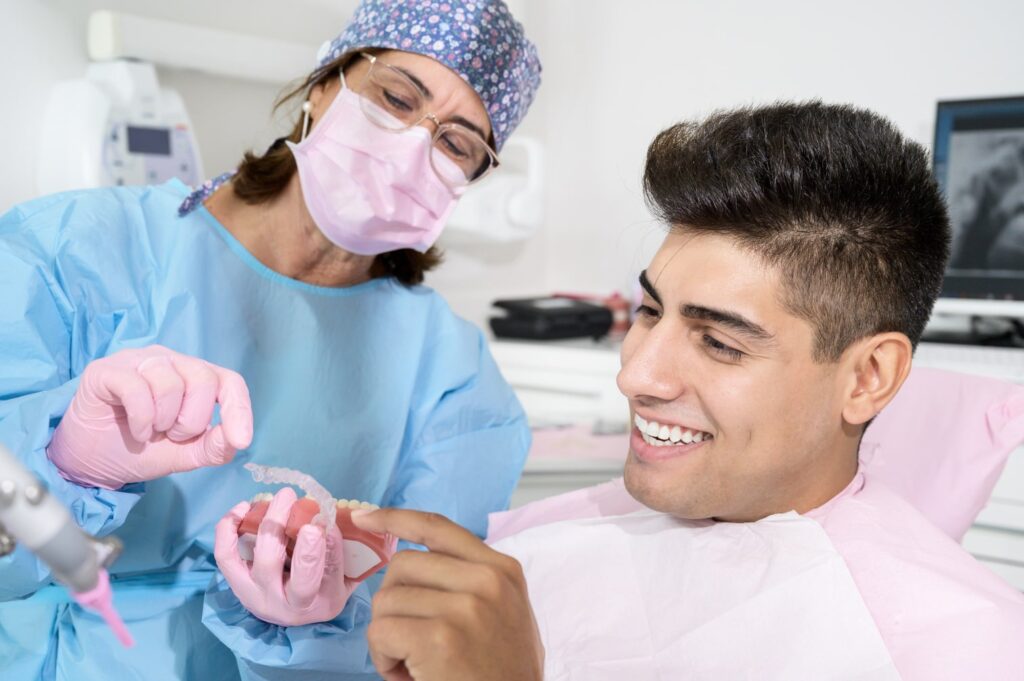Orthodontics is a specialty of dentistry which aims to correct dental malpositions and jaw deformities. Properly conducted orthodontic treatment not only improves the aesthetic appearance of the smile, but also contributes to oral health by preventing future problems such as cavities and periodontal disease.
In this article, we will explore in detail the orthodontic treatment process after an initial self-diagnosis on our Orthodiag app, the different types of appliances available and how to care for your appliance to ensure optimal results.
Orthodontics plays a key role in oral health and the aesthetics of the smile. By correcting problems such as horizontal overbite, malocclusion or overlapping teeth, orthodontic treatment helps to better distribute chewing forces, thus facilitating brushing and preventing cavities. In addition, harmonious dental alignment contributes to a better facial appearance and a dazzling smile.
Thanks to our Orthodiag application, you will no longer need to go to an orthodontist since the first diagnosis is carried out from your phone.


Orthodontic treatments on our Orthodiag app are suitable for all ages, although it is recommended to have an early consultation from childhood to quickly detect and treat growth or tooth alignment problems. Successful orthodontic treatment can have a significant impact on an individual’s quality of life by improving their self-esteem, self-confidence, and social relationships.
The first step in orthodontic treatment consists of a complete self-diagnosis of the mouth, teeth and jaws directly from our Orthodiag application.
This assessment allows the healthcare professional to be able to establish an initial diagnosis and implement treatment before welcoming the patient into their office. This solution is a real time saver for the patient who does not need to travel for an initial diagnosis.


Before treatment begins, the patient must go through a preparation phase which includes taking dental impressions, photos and x-rays. These elements allow the orthodontist to study the patient’s dental situation in detail and choose the brace suited to their needs.
The choice of device depends mainly on the problem to be treated and the patient’s preferences. There are two main categories of appliances: fixed appliances (rings, wires) and removable appliances (gutters). Each type of device has its advantages and disadvantages, which should be carefully weighed when making the final decision.


Regular visits to the orthodontist are essential to monitor the progress of treatment and make any necessary adjustments. Rigorous following of the instructions given by the professional guarantees optimal results and avoids complications or delays in treatment.
Once the goals are achieved, braces are removed and the patient can enjoy the results of the treatment. However, it is essential to maintain a period of restraint to prevent the initial problems from recurring.

Clear aligners are an alternative to traditional fixed appliances. They are almost invisible and can be removed to eat, drink or brush your teeth. Wearing instructions should be followed carefully to ensure effectiveness.
Fixed appliances are made up of rings, metal wires, and small elements called cleats that hold the wire in place. They allow precise control of tooth movements and are generally used to treat more complex cases.
Innovations in the field of orthodontics include invisible braces such as Invisalign, which provide discreet and comfortable treatment, as well as accelerated treatment techniques that help reduce treatment time.
Regular cleaning and brushing of the teeth and appliance is essential to prevent dental problems during treatment. Specific products such as dental floss suitable for orthodontic appliances may be recommended by your professional.

In the event of breakage or detachment of an element of the appliance, it is essential to contact your orthodontist quickly for repair. Follow the practical advice given by the professional while waiting for the consultation.
The cost of orthodontic treatment depends on several factors, such as the duration of treatment, the type of appliance chosen and the complexity of the case. It is therefore difficult to give a precise estimate without an individual assessment.


Reimbursement for orthodontic treatments varies depending on insurance and payment plans offered by professionals. It is essential to learn about the different options available and choose the one that best suits your needs and budget.
In conclusion, thanks to Orthodiag, successful orthodontic treatment can significantly improve an individual’s quality of life in terms of oral health and aesthetics. The key to success lies in choosing the right professional, understanding the treatment process and being motivated to strictly follow the instructions given. Don’t wait any longer to start your journey to a dazzling smile!
L’application d’auto-diagnostic en orthodontie sur votre smartphone !
2024 © tous droits réservés